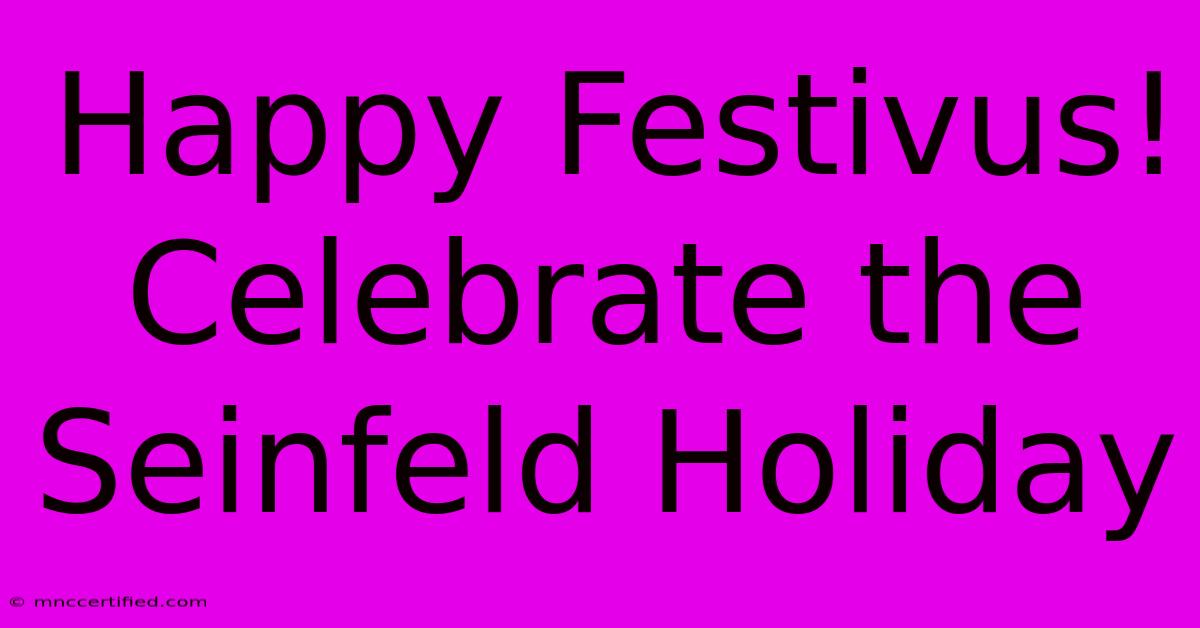Happy Festivus! Celebrate The Seinfeld Holiday

Table of Contents
Happy Festivus! Celebrate the Seinfeld Holiday
Festivus, the holiday for the rest of us, is more than just a quirky Seinfeld episode. It's a cultural phenomenon, a celebration of airing grievances and feats of strength, and a surprisingly relevant commentary on modern life. This guide dives deep into the origins, traditions, and the enduring appeal of Festivus, helping you plan your own celebration.
The Origins of Festivus: A Family Affair
Festivus, unlike many holidays steeped in centuries of tradition, was born relatively recently. Created by comedian Daniel O'Keefe, the holiday is a direct reflection of his own family's experiences and his personal dissatisfaction with the commercialization of Christmas. It first appeared in a 1997 episode of the iconic sitcom Seinfeld, instantly catapulting it into popular culture. While initially a fictional creation, Festivus has transcended its television origins to become a real-world celebration for many.
Key Festivus Traditions: More Than Just Airing Grievances
While the "Airing of Grievances" is undoubtedly the most well-known Festivus tradition, it's only one part of a larger celebration. Let's delve into the key elements that make Festivus unique:
1. The Festivus Pole: A Minimalist Alternative
Forget the ornate Christmas tree; Festivus boasts the unadorned Festivus pole – a simple, un-decorated pole, usually made of aluminum. This minimalist approach symbolizes a rejection of materialistic excess and a focus on the true meaning of the holiday (whatever that may be for you!).
2. The Airing of Grievances: Let's Talk About It
This is where things get interesting (and potentially awkward!). The head of the household invites family members to air their grievances, a cathartic opportunity to express frustrations and disappointments accumulated throughout the year. Remember, this is about honest communication, not outright attacks.
3. The Feats of Strength: Challenge Accepted
The culminating event of Festivus is the Feats of Strength, a wrestling match between the head of the household and another family member (or anyone daring enough to challenge!). This symbolizes overcoming challenges and the struggle for self-improvement. Victory isn't necessarily the goal; participation and the spirit of competition are key.
Planning Your Own Festivus Celebration: A Step-by-Step Guide
Ready to host your own Festivus gathering? Here's a step-by-step guide to ensure a memorable and authentic celebration:
- Gather Your Festivus Crew: Invite your closest friends and family.
- Construct the Festivus Pole: An undecorated aluminum pole is ideal, but a sturdy stick or even a broom handle will do in a pinch.
- Prepare for the Airing of Grievances: Encourage respectful communication and remember that the goal is to resolve issues, not to escalate conflicts.
- Organize the Feats of Strength: Choose your champion wisely. It's okay if the feat of strength is a friendly game instead of a wrestling match. It's about participation and fun!
- Embrace the Spirit of Festivus: Keep it light-hearted and focus on the anti-commercialism aspect of the holiday.
Why Festivus Remains Relevant: A Modern Holiday for Modern Times
In a world increasingly saturated with commercial holidays, Festivus offers a refreshing alternative. Its emphasis on honest communication, self-reflection, and a rejection of materialism resonates deeply with people seeking authenticity and a more meaningful celebration.
Festivus: Beyond the Seinfeld Episode
Festivus isn't just a nostalgic throwback to a beloved TV show; it's a living, breathing holiday that continues to evolve and adapt to modern sensibilities. Its simple traditions and focus on human connection make it a uniquely relatable celebration for people of all backgrounds and beliefs. So, this year, embrace the spirit of Festivus, air your grievances (respectfully!), and celebrate the holiday for the rest of us!
Keywords: Festivus, Seinfeld, holiday, celebration, airing grievances, feats of strength, Festivus pole, traditions, guide, how to celebrate Festivus, modern holiday, anti-consumerism, family gathering, Daniel O'Keefe.

Thank you for visiting our website wich cover about Happy Festivus! Celebrate The Seinfeld Holiday. We hope the information provided has been useful to you. Feel free to contact us if you have any questions or need further assistance. See you next time and dont miss to bookmark.
Featured Posts
-
Dundee Crocodile Burt Dead
Dec 24, 2024
-
Morrisons Reduced Click And Collect Use
Dec 24, 2024
-
Live Santa Tracker 2024 Norad Radar
Dec 24, 2024
-
Josh Jacobs Elite Nfl Rb Again
Dec 24, 2024
-
Walker Buehler Joins Boston Red Sox
Dec 24, 2024